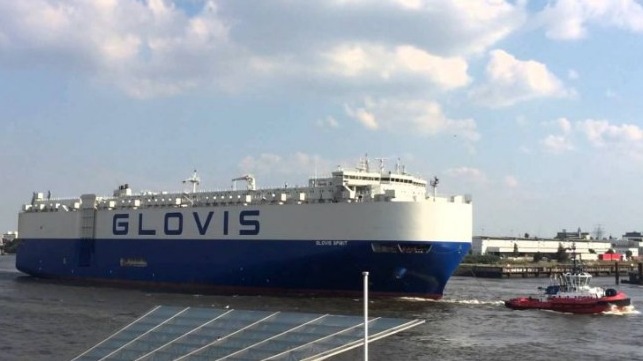Seaspan Orders Largest Car Carriers Entering Market with Hyundai Glovis

As a further demonstration of the strong demand in the car and vehicle transport sector, Seaspan Corporation, which is one of the largest owner-operators of containerships, is jumping into the car carrier segment in a partnership with Hyundai Glovis, one of the largest operators in the segment. The move follows are growing orderbook for car carriers and the entry of other majors into the market, including CMA CGM which chartered its first Pure Car and Truck Carrier (PCTC) for an entry into the segment.
Seaspan signed an order with China’s CSSC for six PCTCs with an option for four additional vessels. No timing was announced for the new ships which will be built by Shanghai Waigaoqiao Shipbuilding. When delivered, they will operate under a long-term time charter to Hyundai Glovis.
The new vessels will be the largest yet built in the category with a capacity of 10,800 CEU. Further, the vessels will be dual-fuel built ready for in the future ammonia or methanol as their primary fuel.
Seaspan which became a privately held company through the takeover of Atlas Corp. last year, cites this as a new opportunity to leverage its expertise in shipbuilding and newly developed experience with LNG propulsion. Seaspan currently has a fleet of over 140 containerships with a combined capacity of more than 1.4 million TEU operating under charter to many of the major carriers. The company highlights it has an additional 47 vessels under construction for delivery through to December 2024 which will add more than 500,000 TEU of capacity. The company built its first LNG-fueled containerships for charter to Zim and highlights that its total 70-vessel newbuild program includes 25 dual-fuel LNG containerships.

that matters most
Get the latest maritime news delivered to your inbox daily.
Hyundai Glovis which operates approximately 80 PCTCs reported in November that its board approved the order of up to a dozen of the world’s largest vessels to expand its operations. By partnering with Seaspan they tap the business model that provides Seaspan’s capital for the construction of the vessels. Hyundai Glovis’ board had approved an investment of $1.84 billion into a new fleet of vessels of up to a dozen 10,800-capacity car carriers.
Currently, the sector’s largest vessels have a capacity of 8,500 units but the industry has been rushing forward with new orders to meet current and anticipated future demand. Supply of car carriers is currently very limited with manufacturers using techniques including loading cars in containers while COSCO developed racks to load cars into the holds of bulkers to address the current lack of transport capacity. Norway’s Wallenius Wilhelmsen is building new vessels with a 9,350 CEU capacity while Höegh Autoliners’ has ordered the Aurora Class PCTC vessels which will accommodate up to 9,100 cars and are also designed to operate on ammonia. It is all part of an overall orderbook approaching 100 new car carriers due for delivery in the next few years.
